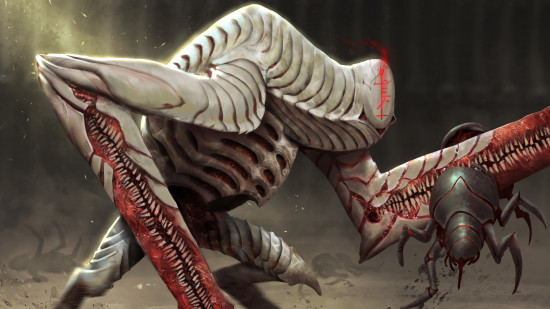If Warhammer 40k is tabletop gaming’s answer to heavy metal, then Trench Crusade is one of those Scandinavian black metal bands that burnt down a church and is running from the law. Its universe of religious fanatics, alchemical abominations, daemonic gore, and soul-shattering warfare has surface shock value far more explicit than anything in Warhammer 40k’s familiar and marketable grimdark – and that’s before you peel back the crust of trench mud and scabs to see what lurks beneath…
Before you accuse me of hyperbole, know that I’ve read somewhere between 150 and 200 Warhammer 40k and Horus Heresy books, not counting 40k Codexes, rulebooks, White Dwarf magazines, and so on. A lifetime spent guzzling Warhammer 40k books has given me quite the refined palette for different flavors of grimdark – and Trench Crusade is raw flesh carved from the face of a screaming innocent.
Trench Crusade is the mind child of Mike Franchina, a concept artist of long-standing for the videogame and tabletop games industry. His art style combines visceral, mutilated bodies with the rich material culture of mediaeval societies, and dieselpunk technology.
He’s responsible for some of the disturbing teeth abominations in the Phyrexia All Will Be One Magic the Gathering Set (above); daemons and sorcerers with inexplicable appendages dressed in medieval Levantine armor and ornamentation in Path of Exile 2; the solid steel Catholic capirote on the Knight Penitent boss fight in Diablo IV, to name but a few.
Posting on X, Franchina says that when he started developing the Trench Crusade world, “I was determined to just draw whatever I liked, with no consideration given to whether or not people liked it”. It was a personal project that let him create “all the stuff I wasn’t allowed to at my day jobs”.
This single authorial voice is one reason why Trench Crusade is such a solid setting. The component factions, and their respective horrors, have come together over a very long time, each one meticulously grounded in lore that Franchina himself has authored. His background as a concept artist shows: lore is brief and evocative, artwork is rendered with phenomenal skill and gruesome detail.
As Pirinen’s pinned self-description reads, “I like to draw fucked up religious freaks”. Because Trench Crusade began life as a setting with no prospects of being commercialised, it goes places that Warhammer 40k – which, scrappy as 1980s GW may have been, has always been a corporate product – never could.
There’s a touch of giallo excess here. Stigmatic nuns with tits covered in blood, walking vivisections, suicidal blasphemers who carry their own severed heads and scream the unfathomable truths they learned in hell.
Some of the art pieces on Franchina’s ArtStation are far bleaker than anything that has appeared in the tabletop game so far: the Prophetic Tacticians are children “surgically, genetically, and chemically altered” to communicate directly with God.
It’s literally profane. While the forces of hell in this damned creation are obviously monstrous and unacceptable, whatever divine power rests in authority over it all is either not omnipotent, or is not benevolent, because the carnage has raged for eight centuries.
Those who hear the Voice of God through the use of special Oculus Helmets are doomed to hear its noise resounding in their ears eternally, only able to sleep through heavy chemical sedation.
The price of fighting the war against hell is an ever-growing insanity, masochism, callousness, and martyrdom complex on the part of the un-damned world. Fans of Dark Souls or Elden Ring lore may resonate with the theme of a war between outer powers that catches mortal beings in its apocalyptic crossfire.
Trench Crusade may be underpinned by black metal aesthetics, but it is also deeply tied to the real world. It is a wildly divergent history, admittedly, which starts with Crusaders opening a portal to hell in 1099, follows a war that continues to the current era of 1914, and includes such notable events as Heretic scientists creating the first submarines in 1866, and the Church Space Program opening in 1899.
But it takes place on earth, and is informed by the history of real-world warfare, and the many cultures of Europe, Mediterranean, and the Middle East from the Middle Ages onwards.
That’s backed up by Franchina’s passion for real world clothing, religious iconography, weapons, jewellery, and art. While some Warhammer 40k factions (particularly Astra Militarum regiments) take inspiration from particular earth cultures or military units, Franchina answers the question: “If Sufist alchemy was both real and totally heavy metal, what would Janissary super-soldiers look like?”
All this grounding means the stakes are higher. In Warhammer 40k, if the Space Marines can’t hold back the forces of Chaos, a billion squillion people will die. But to paraphrase one of history’s greatest monsters, the death of one is a tragedy, the death of millions just a statistic. New Antioch, the front line in Christendom’s war against hell, is just more real than 40k’s Warzone Vigilus.
Whereas 40k is a purpose-built backdrop for wargames, Trench Crusade exists for no other reason than to explore the far limits of a war between God and Hell, with mankind caught in the middle. It speculates openly about the nightmares that the Religious Military Industrial Complex would produce in ways that a traditional commercial product could not. And Franchina seems uniquely qualified to explore that horror to its fullest.
Already backed the Trench Crusade Kickstarter and want to get more use from the miniatures? We can recommend a couple of miniature wargames by Osprey. A War Transformed is a platoon level wargame that focuses on the historical belligerents of the Great War but adds in plenty of occult nastiness.
If you want a lightweight game with tons of charm that positively begs for gnarly new monster miniatures, check out our review of The Doomed to find your new fave.
Source: Wargamer




